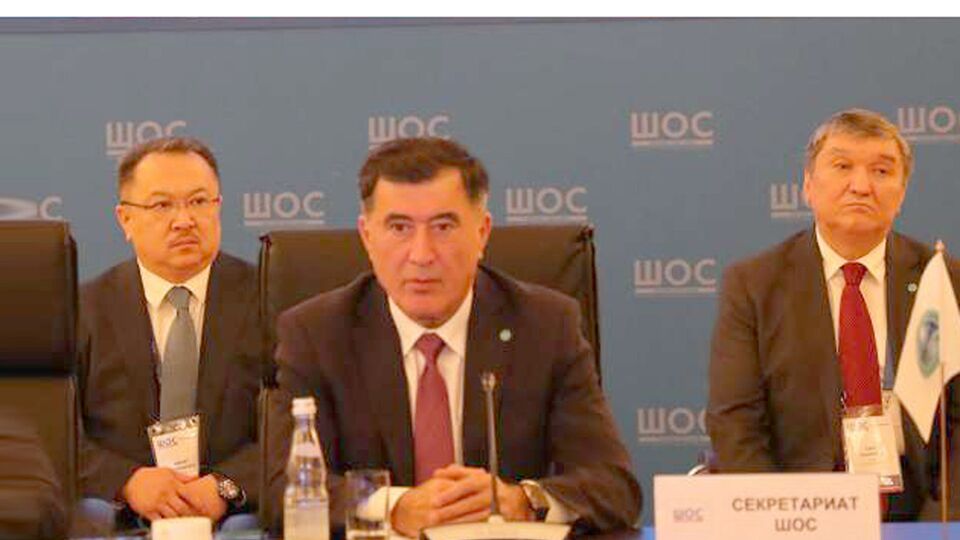On 10 September, SCO Secretary-General Vladimir Norov attended a meeting of the Council of Foreign Ministers of the Shanghai Cooperation Organisation.
The SCO Secretary-General pointed out that the coronavirus pandemic had not prevented the implementation of Russia's SCO chairmanship priorities, such as continued efforts to strengthen the member states' foreign policy coordination, promote the synergy of their national development strategies, and improve the multilateral mechanisms of security, economic and humanitarian cooperation.
When speaking about the invaluable joint experience of efforts to prevent the spread and minimise the negative consequences of the pandemic, Vladimir Norov mentioned the importance of the decision taken at a recent meeting of the SCO health ministers to approve the Overview of the Best Practices of the SCO Member States to counter the spread of the virus. In this context he mentioned the ideas put forth in the SCO Secretariat's proposal on strengthening a coordination platform to jointly counteract pandemics, which have been reflected in a draft action plan that is to be submitted for adoption at the upcoming summit of the SCO heads of state.
Vladimir Norov added that analytical working groups had been established at the SCO Secretariat to combat the spread of the coronavirus infection, take advantage of the potential of traditional medicine and protect the SCO countries' food and energy safety.
He noted that the SCO countries' collective efforts against unforeseen epidemiological risks had been commended by the UN Secretary-General and the heads of other leading international organisations.
The SCO Secretary-General emphasised the importance of finding common solutions when it comes to improving security mechanisms within the SCO framework amid the expanding functions of the existing institutional structures and the development of new ones.
He focused on the practical efforts to implement the roadmap of the SCO-Afghanistan Contact Group in the context of the country's peaceful reconstruction. "Given the accelerated withdrawal of foreign troops from Afghanistan, it is becoming increasingly important to create conditions for a transition to peaceful life and economic reconstruction. In this connection, the design and construction of the Mazar-i-Sharif — Herat and Mazar-i-Sharif — Peshawar railway lines across Afghanistan, co-financed by the Asian Infrastructure Investment Bank, must be accelerated. The implementation of this initiative will not only help to increase trade with Afghanistan, but will also be the first step towards creating a new trans-regional corridor giving the Eurasian countries, including the landlocked Central Asian states, direct access to the seaports of India, Iran and Pakistan and making it a vital element of the North-South and East-West transport corridors."
Vladimir Norov mentioned considerable achievements in the development of the SCO's international contacts aimed at combating international security challenges and threats and at building up joint capabilities in the economic and humanitarian spheres.
The SCO Secretary-General highlighted the importance of the draft Action Plan for the Implementation of the SCO Development Strategy until 2025 when it comes to the recovery of member states' national economies in the post-pandemic period.
He also highlighted the increasing importance of promoting sports as a healthy way of life in the SCO space amid the pandemic, for example, through the SCO Kunming marathon.
"This year the Kunming marathon received the Silver Label of the International Association of Athletics Federations (IAAF World Athletics), which is proof of its importance and potential. The upcoming marathon scheduled for December cannot be held in the traditional format. This is why we discussed holding it online and in the form of separate marathon races in individual SCO countries," Vladimir Norov noted.
He also informed the participants of the Council of Foreign Ministers Meeting about the SCO Secretariat's activities in the fields of healthcare and food and energy security, the joint events held with UN bodies on the symbiosis of terrorism, drug trafficking and organised crime, as well as working contacts with ASEAN, OSCE and Interpol secretariats based on a similarity of views in combating new challenges and threats in Eurasia.
